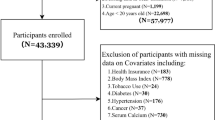Summary
The relationship of metabolic syndrome (MS) and its components with incident chronic kidney disease (CKD) and rapid decline of estimated glomerular filtration rate (eGFR) was investigated. A total of 10 140 patients participating in the epidemiological study (Risk Evaluation of Cancers in Chinese Diabetic Individuals, REACTION) of risk factors of type 2 diabetes in China were followed up for 3 years, with MS being diagnosed by adult treatment panel III (ATPIII) combined with waist circumference in Asian population and renal function being evaluated by eGFR <60 mL·min−1(1.73 m2)−1 and rapid decline of eGFR ≤30%. The results showed that as compared with the non-MS group, the adjusted odds ratios (ORs) of CKD and rapid decline of eGFR were 1.64 (OR: 1.64; 95% CI: 1.20–2.25, P<0.05) and 1.23 (OR: 1.23; 95% CI: 1.05–1.43, P<0.05) respectively in MS group. With the increase in the number (0, 1, 2, 3 and ≥4) of MS components, the prevalence of CKD was 1.42%, 1.44%, 2.80%, 3.42%, and 4.03% (P<0.001), respectively. The ORs of incident CKD were 1.67 (OR: 1.67; 95% CI: 1.22–2.27, P<0.05) for high TG, 1.50 (OR: 1.50; 95% CI: 1.10–2.05, P<0.05) for low HDL-C, and 1.39 (OR: 1.39; 95% CI: 1.02–1.91, P<0.05) for hyperglycemia. The risk for developing incident CKD was higher in the group with the highest HOMA-IR than in the group with the lowest HOMA-IR (OR: 1.83; 95% CI: 1.16–2.89, P<0.05). It is suggested that MS is an independent risk factor for incident CKD. The occurrence and development of CKD is closely related to insulin resistance.
Similar content being viewed by others
References
Coresh J, Selvin E, Stevens LA, et al. Prevalence of Chronic Kidney Disease in the United States. JAMA, 2007,298(17):2038–2047
Murphy D, McCulloch CE, Lin F, et al. Trends in Prevalence of Chronic Kidney Disease in the United States. Ann Intern Med, 2016,165(7):473–481
Zhang L, Wang F, Wang L, et al. Prevalence of chronic kidney disease in China: a cross-sectional survey. Lancet, 2012,379(9818):815–822
Go AS, Chertow GM, Fan D, et al. Chronic kidney disease and the risks of death, cardiovascular events, and hospitalization. N Engl J Med, 2004,351(13):1296–1305
Dilullo L, House A, Gorini A, et al. Chronic kidney disease and cardiovascular complications. Heart Fail Rev, 2015,20(3):259–272
Gurka MJ, Guo Y, Filipp SL, et al. Metabolic syndrome severity is significantly associated with future coronary heart disease in type 2 diabetes. Cardiovasc Diabetol, 2018,17(1):17
Hu W, Wu XJ, Ni YJ, et al. Metabolic syndrome is independently associated with a mildly reduced estimated glomerular filtration rate: a cross-sectional study. BMC Nephrol, 2017,18(1):192
Huh JH, Yadav D, Kim JS, et al. An association of metabolic syndrome and chronic kidney disease from a 10-year prospective cohort study. Metabolism, 2017,67(2):54–61
Li R, Li W, Lun Z, et al. Prevalence of metabolic syndrome in mainland China: a meta-analysis of published studies. BMC Public Health, 2016,16(1):296
Hu Y, Shi LX, Zhang Q, et al. Metabolic syndrome and its components associated with glomerular filtration rate in middleaged and elderly population. Chin J Endocrinol Metab (Chinese), 2017,33(5):372–376
Li Y, Xie D, Qin X, et al. Metabolic syndrome, but not insulin resistance, is associated with an increased risk of renal function decline. Clin Nutr, 2015,34(2):269–275
Expert Panel on Detection, Evaluation, and Treatment of High Blood Cholesterol in Adults. Executive Summary of The Third Report of The National Cholesterol Education Program (NCEP) Expert Panel on Detection, Evaluation, And Treatment of High Blood Cholesterol In Adults (Adult Treatment Panel III). JAMA, 2001,285(19):2486–2497
WHO Western Pacific Region, IASO IOTF. The Asia-Pacific Perspective: Redefining Obesity and Its Treatment. Sydney, Australia, Health Communications Australia Pty Limit Available: https://doi.org/www.wpro.who.int/nutrition/documents/Redefining_obesity/en/. Accessed 2014 May 4.
Coresh J, Turin TC, Matsushita K, et al. Decline in estimated glomerular filtration rate and subsequent risk of end-stage renal disease and mortality. JAMA, 2014,311(24):2518–2531
Sun F, Tao Q, Zhan S. Metabolic syndrome and the development of chronic kidney disease among 118 924 non-diabetic Taiwanese in a retrospective cohort. Nephrology, 2010,15(1):84–92
Hayashi K, Takayama M, Abe T, et al. Investigation of Metabolic Factors Associated with Incident CKD Over 1 Year in a Japanese Population without CKD. Atheroscler Thromb, 2017,24(8):863–875
Lee HS. Mechanisms and consequences of hypertriglyceridemia and cellular lipid accumulation in chronic kidney disease and metabolic syndrome. Histol Histopathol, 2011,26(12):1599–1610
Whaley-Connell A, Sowers JR. Insulin Resistance in Kidney Disease: Is There a Distinct Role Separate from That of Diabetes or Obesity? Cardiorenal Med, 2017,8(1):41–49
Cooper SA, Whaley-Connell A, Habibi J, et al. Renin-angiotensin-aldosterone system and oxidative stress in cardiovascular insulin resistance. Am J Physiol Heart Circ Physiol, 2007,293(4)293:H2009–2023
Nistala R, Whaley-Connell A. Resistance to insulin and kidney disease in the cardiorenal metabolic syndrome; role for angiotensin II. Mol Cell Endocrinol, 2013,378(1–2):53–58
Wang Y, Wei RB, Yang Y, et al. Valsartan Alleviates Insulin Resistance in Skeletal Muscle of Chronic Renal Failure Rats. Med Sci Monit, 2018,24(4):2413–2419
Author information
Authors and Affiliations
Corresponding author
Additional information
This study was supported by grants from the National Key R&D Program of China (No. 2016YFC0901200), Science and Technology Planning Project of Guizhou Province of China (No. LH[2014]7107), Key Clinical Department Training Project of Guizhou Province in 2016, China (No. SZD-2016-01), and Guizhou Provincial Health Planning Committee Science and Technology Fund Project, China (No. gzwjkj2018-1-019)
Conflict of Interest Statement
The authors declare no conflict of interest.
Rights and permissions
About this article
Cite this article
Hu, Y., Shi, Lx., Zhang, Q. et al. Increased Risk of Chronic Kidney Diseases in Patients with Metabolic Syndrome: A 3-year Prospective Cohort Study. CURR MED SCI 39, 204–210 (2019). https://doi.org/10.1007/s11596-019-2020-8
Received:
Revised:
Published:
Issue Date:
DOI: https://doi.org/10.1007/s11596-019-2020-8




